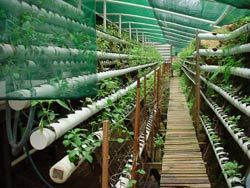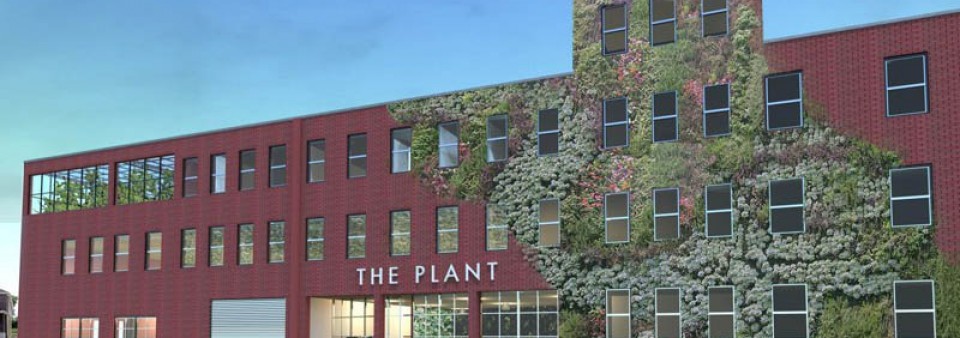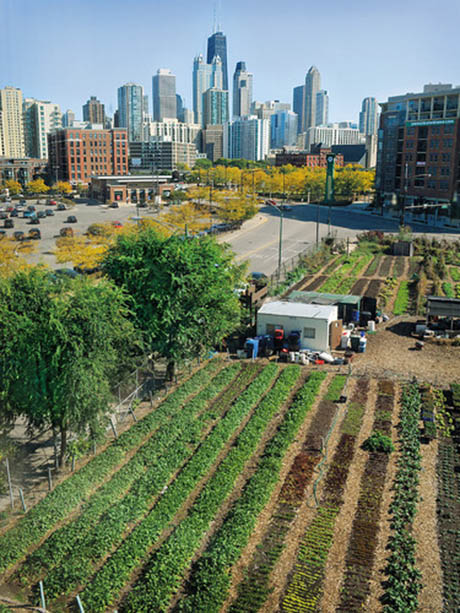As a student working under the Wetland Finance program at the Environmental Finance Center at UNC Chapel Hill, I spend most of my time exploring options for financing wetland protection. I’ve been studying new and creative ways to account for the value of the ecological processes that wetlands provide, including carbon exchange, natural filtration, and purification. While I’ve spent hours researching and crafting spreadsheets, I’ve learned the importance of ensuring sustainable revenue streams for environmental initiatives. I believe that this strategy is also beneficial to locally-based agriculture in rural and urban settings.
Localized agricultural models of food production carry undeniable advantage and are growing in popularity. Farmer’s markets are springing up with increasing frequency, but finding affordable options for growing and distributing food in urban settings and areas with disagreeable climates can be a challenge. Two budding agribusinesses – The Plant in Chicago, Illinois and Vertical Harvest in Jackson, Wyoming – have devised a unique funding mix that can be scaled to other cities, and even to remote, rural areas.
Both The Plant and Vertical Harvest utilize hydroponic or aquaponic techniques to grow vegetables indoors. Essentially, hydroponic farming refers to a technique involving growing plants on floating rafts in nutrient-enriched water, and aquaponic farming refers to the cultivation of fish (aquaculture) to contribute to the nutrient cycle.

Currently, 95% of Vertical Harvest’s projected yields have been claimed in advance delivery contracts for area businesses. Vertical Harvest is not intended to compete with local farmers – rather, this agribusiness has identified the market of fruits and vegetables imported from large out-of-state farms as their target. Vertical Harvest’s Program Directors chose to structure the business as a low-profit limited liability company, with the intent of reducing reliance on donor gifts in Vertical Harvest’s financing model. Vertical Harvest partnered with the non-profit Arthur and Friends for their experience and expertise in hydroponic greenhouse farming, educational initiatives, and model to employ people with disabilities. In addition to many traditional sponsors, Vertical Harvest’s program directors successfully raised $36,270 on Kickstarter.com, a web-based crowd-sourcing platform.
The Plant also used Kickstarter as a non-conventional source of funding. The Plant’s anaerobic digester, a key component of their net-zero energy system, was funded through $1.5 million in state grant money from the Illinois Department of Commerce and Economic Opportunity (Said-Morehouse). The Plant is a partnership between Plant Chicago, a non-profit, and Bubbly Dynamics, LLC, a limited liability corporation that manages leasing farm space and energy costs. According to the IRS, an LLC is similar to a partnership for tax filing purposes, but with some rights and personal protection comparable to a corporation. The Plant has also made important advances in public policy for urban agriculture, including the City of Chicago’s recently adopted Urban Agriculture Ordinances, which clearly delineated the distinction between urban farms and community gardens (City of Chicago). This ordinance also allows for The Plant’s possible expansion into bee-keeping and livestock.

Widespread support of these initiatives – united at the community, corporate, and local policy levels – indicates that a lasting foundation is possible for urban and vertical farms as a business model that can prosper in non-traditional farming communities.
Emily Kosmala is a Research Assistant at the Environmental Finance Center at UNC Chapel Hill. She began working with the EFC in Fall 2013 as an assistant to the wetland finance project. She will graduate in May 2014 From UNC’s Kenan-Flagler Business School with a B.S. in Business Administration, Marketing Management concentration and a minor in Sustainability.



2 Responses to “Financing Urban Agriculture: a Growing Field of Possibilities”
Emanuel Harris
Love what you guys are doing! keep it up!
http://hptreeandfence.com/
George Agboh
15a Owode Str Abule Egba Lagos Nigeria
This is definetely a great initiative and I wish we could replicte this model in Nigeria especially the Sub-Urban and cities as well
I am definetely intrested